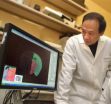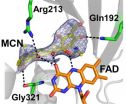(Press-News.org) AUGUSTA, Ga. – As we age, it just may be the ability to filter and eliminate old information – rather than take in the new stuff - that makes it harder to learn, scientists report.
"When you are young, your brain is able to strengthen certain connections and weaken certain connections to make new memories," said Dr. Joe Z. Tsien, neuroscientist at the Medical College of Georgia at Georgia Regents University and Co-Director of the GRU Brain & Behavior Discovery Institute.
It's that critical weakening that appears hampered in the older brain, according to a study in the journal Scientific Reports.
The NMDA receptor in the brain's hippocampus is like a switch for regulating learning and memory, working through subunits called NR2A and NR2B. NR2B is expressed in higher percentages in children, enabling neurons to talk a fraction of a second longer; make stronger bonds, called synapses; and optimize learning and memory. This formation of strong bonds is called long-term potentiation. The ratio shifts after puberty, so there is more NR2A and slightly reduced communication time between neurons.
When Tsien and his colleagues genetically modified mice that mimic the adult ratio – more NR2A, less NR2B – they were surprised to find the rodents were still good at making strong connections and short-term memories but had an impaired ability to weaken existing connections, called long-term depression, and to make new long-term memories as a result. It's called information sculpting and adult ratios of NMDA receptor subunits don't appear to be very good at it.
"If you only make synapses stronger and never get rid of the noise or less useful information then it's a problem," said Tsien, the study's corresponding author. While each neuron averages 3,000 synapses, the relentless onslaught of information and experiences necessitates some selective whittling. Insufficient sculpting, at least in their mouse, meant a reduced ability to remember things short-term – like the ticket number at a fast-food restaurant – and long-term – like remembering a favorite menu item at that restaurant. Both are impacted in Alzheimer's and age-related dementia.
All long-term depression was not lost in the mice, rather just response to the specific electrical stimulation levels that should induce weakening of the synapse. Tsien expected to find the opposite: that long-term potentiation was weak and so was the ability to learn and make new memories. "What is abnormal is the ability to weaken existing connectivity."
Acknowledging the leap, this impaired ability could also help explain why adults can't learn a new language without their old accent and why older people tend to be more stuck in their ways, the memory researcher said.
"We know we lose the ability to perfectly speak a foreign language if we learn than language after the onset of sexual maturity. I can learn English but my Chinese accent is very difficult to get rid of. The question is why," Tsien said.
Tsien and his colleagues already have learned what happens when NR2B is overexpressed. He and East China Normal University researchers announced in 2009 the development of Hobbie-J, a smarter than average rat. A decade earlier, Tsien reported in the journal Nature the development of a smart mouse dubbed Doogie using the same techniques to over-express the NR2B gene in the hippocampus.
Doogie, Hobbie-J and their descendants have maintained superior memory as they age. Now Tsien is interested in following the NR2A over-expressing mouse to see what happens.
INFORMATION:
Tsien is the Georgia Research Alliance Eminent Scholar in Cognitive and Systems Neurobiology. The research was funded by the National Institutes of Health and the GRA.
Eliminating useless information important to learning, making new memories
2013-01-09
ELSE PRESS RELEASES FROM THIS DATE:
Research: Bad news can spur strategic change in businesses
2013-01-09
CHAMPAIGN, Ill. — Negative media coverage may prompt firms to engage in greater levels of strategic change than previously thought, according to research by a University of Illinois business professor.
While businesses have typically viewed the news media as a megaphone for publicity, businesses have not viewed the media as an influential stakeholder capable of shaping the strategic decisions of key executives, says Michael K. Bednar, a professor of business administration at Illinois.
"As the news media reports negatively about firms, that registers with executives," ...
US health disadvantage spans age and socioeconomic groups
2013-01-09
WASHINGTON — On average, Americans die sooner and experience higher rates of disease and injury than people in other high-income countries, says a new report from the National Research Council and Institute of Medicine. The report finds that this health disadvantage exists at all ages from birth to age 75 and that even advantaged Americans -- those who have health insurance, college educations, higher incomes, and healthy behaviors -- appear to be sicker than their peers in other rich nations.
"We were struck by the gravity of these findings," said Steven H. Woolf, professor ...
Scientists use marine robots to detect endangered whales
2013-01-09
Two robots equipped with instruments designed to "listen" for the calls of baleen whales detected nine endangered North Atlantic right whales in the Gulf of Maine last month. The robots reported the detections to shore-based researchers within hours of hearing the whales (i.e., in real time), demonstrating a new and powerful tool for managing interactions between whales and human activities.
The team of researchers, led by Woods Hole Oceanographic Institution (WHOI) scientists Mark Baumgartner and Dave Fratantoni, reported their sightings to NOAA, the federal agency responsible ...
Drug resistance: 'Baby steps' can pay off big
2013-01-09
HOUSTON -- (Jan. 9, 2013) -- Rice University scientists have found that mutations of small effect can turn out to be game changers in the bacterial fight against antibiotic drugs.
The discovery came during an exhaustive, three-year effort to create a mathematical model that could accurately predict how specific mutations allow bacteria like E. coli to adapt to antibiotics like minocycline. The findings are detailed in a Dec. 10 study in the Proceedings of the National Academy of Sciences.
"As biologists, we tend to focus on big effects that result from big changes, ...
Hold the diet soda? Sweetened drinks linked to depression, coffee tied to lower risk
2013-01-09
SAN DIEGO – New research suggests that drinking sweetened beverages, especially diet drinks, is associated with an increased risk of depression in adults while drinking coffee was tied to a slightly lower risk. The study was released today and will be presented at the American Academy of Neurology's 65th Annual Meeting in San Diego, March 16 to 23, 2013.
"Sweetened beverages, coffee and tea are commonly consumed worldwide and have important physical—and may have important mental—health consequences," said study author Honglei Chen, MD, PhD, with the National Institutes ...
Study shows cognitive benefit of lifelong bilingualism
2013-01-09
Washington, DC — Seniors who have spoken two languages since childhood are faster than single-language speakers at switching from one task to another, according to a study published in the January 9 issue of The Journal of Neuroscience. Compared to their monolingual peers, lifelong bilinguals also show different patterns of brain activity when making the switch, the study found.
The findings suggest the value of regular stimulating mental activity across the lifetime. As people age, cognitive flexibility — the ability to adapt to unfamiliar or unexpected circumstances ...
Nobel laureate James Watson publishes novel hypothesis on curing late-stage cancers
2013-01-09
Cold Spring Harbor, NY – "Although mortality from many cancers has been steadily falling, particularly those of the blood [i.e., leukemias], the more important statistic may be that so many epithelial cancers (carcinomas) and effectively all mesenchymal cancers (sarcomas) remain largely incurable."
With these words as preface, Nobel laureate James D. Watson, Ph.D., in a newly published paper that he regards "among my most important work since the double helix," sets forth a novel hypothesis regarding the role of oxidants and antioxidants in cancers that are currently ...
Vitamin D supplementation does not reduce knee pain, cartilage loss in patients with osteoarthritis
2013-01-09
CHICAGO – In a two year randomized trial, patients with symptomatic knee osteoarthritis who received vitamin D supplementation did not have a significant difference in knee pain or cartilage volume loss compared to patients who received placebo, according to a study appearing in the January 9 issue of JAMA.
"Knee osteoarthritis (OA) is a common age-related musculoskeletal disorder that has significant functional impact and has considerable societal costs through work loss, early retirement, and arthroplasty. Despite its impact, there are no medical treatments established ...
Study documents failure rate of antibiotic treatment for gonorrhea
2013-01-09
CHICAGO – In an examination of the effectiveness of cefixime, the only oral cephalosporin antimicrobial recommended for treatment of Neisseria gonorrhoeae (gonorrhea) infections, researchers found a clinical treatment failure rate of nearly 7 percent for patients treated at a clinic in Toronto, according to a preliminary study published in the January 9 issue of JAMA.
"Because of Neisseria gonorrhoeae resistance to all prior first-line antimicrobial agents, cephalosporin [antibiotic] therapy with adjuvant azithromycin or doxycycline is recommended for treatment of gonorrhea," ...
Post-operative intravenous acetaminophen may help reduce use of morphine in infants
2013-01-09
CHICAGO – Among infants undergoing major surgery, postoperative use of intermittent intravenous paracetamol (acetaminophen) for the management of pain resulted in a lower cumulative morphine dose over 48 hours, according to a study appearing in the January 9 issue of JAMA.
Opioid therapy for the treatment of pain is associated with adverse effects. Researchers are seeking alternative analgesic regimens in neonates and infants, according to background information in the article. Paracetamol has been proposed as an alternative, with one study showing promise.
Ilse Ceelie, ...



